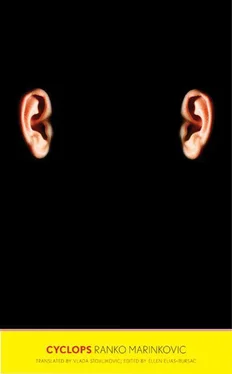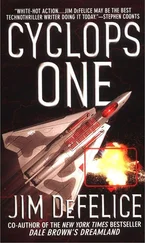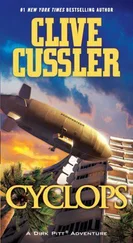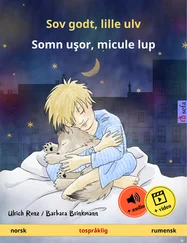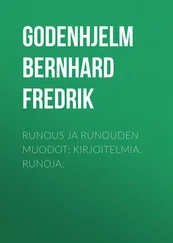He was in front of Enka’s house.
“I have often walked down this street before …” he hummed in a low voice (there was a song that went like that) and halted at the door. What on earth’s the matter with me? He knew there was no reason at all to go upstairs. None at all? — No! he replied resolutely and turned his back to the door.
Yes, but where to? The street is short, empty, morose. Closed in on either side by the questions right? left? He spared each side a contempt-inspired look. Weak motives as motives go: one corner with a sundries shop (a loping deer — Zlatorog soap), the other a stunted bare sapling tied protectively to a pole — authority. Enter motive-following action. Buridan’s ass finally met its death in plenty (the pampered creature), indeed it had two haystacks to choose between (luxury!), but it died for a principle like some heroic character out of Corneille, hail to him! Hail to Buridan’s ass between the two haystacks … whereas I wasn’t given so much as two straws to decide between, not a hollow straw to clutch at …
Numbly he watched the descent of the sparse snowflakes: disappearing before even touching down. The brief life of a snowflake. Flutter and die. And yet, how the duration may seem long to the flake! A life of insubstantial weightlessness, a floating, a white dream on the way from sky to Earth … And the Earth spells the end of that masterpiece, the fallen star made of lacy crystals.
He was looking at the tiny perfection on his sleeve. The minute six-pointed wonder! (All snow stars are six-pointed … it’s presumably prescribed by a celestial canon of beauty.) The white star shining on a dark sky of unworthy cloth. Displaying a peaceful, wise, meek dignity of its orderly whiteness in this world of black, disorderly, back-to-savagery things. The Cyclops Polyphemus, the beast, now treads the Earth. You can feel his contagious breath … The tiny white star winkled out, melted into a dewdrop.
Right or left? stirred Melkior. Here are your motives: the Zlatorog soap-ad yellow deer and the stunted young tree next to its warden, the dry, self-righteous pole. He opted for the pole. It was after all some kind of authority, was that prideful male vertical. It was advancing to meet the events … while the deer (yellow to boot!) was rearing in panicky flight, a clear picture of fear, run for your life!
Melkior approached the runty sapling: all of its buds were still firmly closed, the little one was still afraid to face the world. He patted the pole: hello, Stoic! Seneca, in burning Rome!
On that side of the street the houses were sparser. Two-story family houses in the middle of small decorative garden plots protected by dogs and iron (bars).
From the houses came music, jaunty, bright, holiday-like, middle class; after a heavy lunch, a siesta by the gramophone: operetta, pop hit, march tran-tam, ran tan-tam … Baron Trenk. Once more to offer you my hand before we paaart. When you’re all alone and far from home … A flashing thought of Viviana, bitter solitude, envy of home and hearth … “A home of one’s own.” A homeland have I … What’s “my homeland”? The street, the Give’nTake, Enka’s bedroom, the “separate-entrance room” at Mrs. Ema’s? They’re already looking for the deserting volunteer there … The “New World Order” will by now have been established at the Give’nTake, there’s likely to be a new Kio at Enka’s … Let us go, then, you and I to the broad expanses of our Homeland! To the meadows, to the fields with the shepherd’s pipe … thy flatlands dear … To the pampas, gaucho, to the prairies! To the deserts to gnaw at the roots of prophets and catch grasshoppers in preparation for the great temptation …
He was already striding along outside city limits, through the fields, down well-trodden muddy lanes. He still heard a tram’s ting-a-ling from the suburban terminus. Goodbye, Melkior said to it, the time for joking is over, I’m not accepting the ting-a-ling. I’m off to face Polyphemus the man-eater who now treads the Earth … in order to scuttle between his legs before he plugs the cave entrance with his rock. And when I’m out (if I’m out) I’ll shout for all I’m worth: Cyclops, you one-eyed bloodthirsty brute … — Why do you go and taunt the savage again? — lf only I could rob him of life and soul!
In the distance there resounded a loud crack. At nearly the same instant an angry insect in furious flight whizzed past Melkior’s ear. He hugged the Earth in a trice.
That’s the one from Essen, ha-ha, laughed Melkior’s nose in the wet grass. Missed me, ha-ha! Let the Earth hear, whispered Melkior into the mud beneath, let the pipes play: Polyphemus the Cyclops, the one-eyed bloodthirsty brute, Polyphemus the Cyclops, the one-eyed bloodthirsty brute …
A light was glowing around him, as if a setting sun had pierced the clouds. But Melkior was not lifting his head: he was prostrating himself before his great good fortune which had lain down along his back, pressing him to the Earth. Don’t stir, don’t move a finger, play dead, said Fortune. — I will, I will, I will, he panted obediently. … Because that thing may still be after me, right? asked Melkior sensibly. — Where are you off to, he said to an ant which was clambering up a leaf of grass and using its feelers to examine the strange thicket above its eye ( and brushwood and brambles and brackens , says the ant perhaps), why do you go and taunt the savage? Don’t move, play dead. But the ant is not heeding Fortune … there’s nothing that can touch it … it is counting the hairs in Melkior’s eyebrow. Irritating, tickling …
Melkior is not even blinking, not betraying Fortune: if she says you’re dead, that’s it — you’re dead. The main thing is you know it and can tell yourself you’re dead, you mustn’t even blink. To live, now there’s the challenge. So tell the grass (Fortune advises him): don’t grow, spring won’t put forth its buds here. What is the point of flowers and green leaves? He leaves nothing behind, he will trample everything underfoot, browse everything bare … scoff at all of spring. And tell the Earth: don’t wake up … be a cold, icy, darkness-bound, hard, unfriendly rock. Be a dark home to the dead. Be a grave. And tell yourself (Fortune tells him): don’t breathe, don’t stir — he will guzzle your breath, break your movements. Crawl underground to gnaw the roots of hermits, crawl underwater, under the stone like a beetle …
Look, one had just crawled out from under a stone. Making straight for his eye. Horned, hairy on the belly and sides, weighed down by the hard plate glistening metallically on its insidious bent back. Moving awkwardly, clumsily, on long articulated legs — six all told, Melkior counted. The huge monster had filled the field of vision of his one eye (he has closed the other one).
Melkior did not blink.
The giant insect — an omnivore, a pantophage (as described by Edgar Allan Poe) was having trouble pushing through the thicket. It was hampered by its legs, its horns, it was pressed by the heavy armor of its backplate … but it had its eyes thrust exploringly forward, outside its head; it was pushing its greedy way to its target — Melkior’s eye.
Melkior did not blink.
Hear me, ghost … he launched into his speech at the last moment (it’s going to pierce my eye with its horn!), but the unstoppable insect had already covered all of his vision, snuffed the light out, blocked out the world. …
He’s shoved his stone in place as a plug, said Melkior and let his head drop helplessly to the Earth’s bosom: oh, Mother …
He heard a rumble deep below. The Earth trembled beneath him.
Читать дальше
